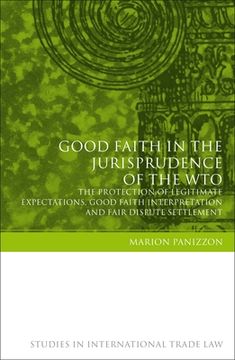Share
good faith in the jurisprudence of the wto: the protection of legitimate expectations, good faith interpretation and fair dispute settlement
Marion Panizzon
(Author)
·
Bloomsbury Publishing PLC
· Hardcover
good faith in the jurisprudence of the wto: the protection of legitimate expectations, good faith interpretation and fair dispute settlement - Panizzon, Marion
Choose the list to add your product or create one New List
✓ Product added successfully to the Wishlist.
Go to My Wishlists
Origin: U.S.A.
(Import costs included in the price)
It will be shipped from our warehouse between
Tuesday, July 02 and
Friday, July 12.
You will receive it anywhere in United Kingdom between 1 and 3 business days after shipment.
Synopsis "good faith in the jurisprudence of the wto: the protection of legitimate expectations, good faith interpretation and fair dispute settlement"
This book is the first to account for what good faith stands for in international trade law. The book describes how, why, and when the concept of good faith links WTO Agreements with public international law. It serves as a reference guide for scholars and practitioners by analyzing how GATT (General Agreement on Tariffs and Trade)/WTO dispute settlement institutions apply good faith in practice. Good faith is a general principle of law operating alongside treaties and customary rules. In WTO law, the principle of pacta sunt servanda, the prohibition of abus de droit, and the protection of legitimate expectations are considered to be corollaries of the principle of good faith. An analysis of GATT 1947 and WTO case law reveals that the function of the principle of good faith varies. Panel and the Appellate Body reports make different uses of it. The Appellate Body is prepared to apply the principle to WTO provisions only, while Panels use it more freely and substantively, applying good faith to fill lacunae in any of the WTO covered agreements. Additionally, adjudicators use the principle to strike a balance between the obligation to liberalize trade and the right to invoke an exception from trade liberalization for the protection of the environment, culture, public morals, and human life or health. In this way, good faith safeguards the gains of multilateral trade liberalization against disgenuine interests, such as disguised protectionism.
- 0% (0)
- 0% (0)
- 0% (0)
- 0% (0)
- 0% (0)
All books in our catalog are Original.
The book is written in English.
The binding of this edition is Hardcover.
✓ Producto agregado correctamente al carro, Ir a Pagar.

